The Quick Guide to Teaching English in Korea
Updated: June 2020. Originally published: June 2016.
We all know that traveling abroad opens doors to experience new cultures. Participating long-term in a foreign culture allows one to dig even further. Whether it’s working, studying, or volunteering, giving back to the community can provide a deeper perspective than being a tourist.
As the world becomes more connected, the demand for English education is soaring. There are opportunities for native English speakers to teach across the globe, but this article is specific for South Korea. There may be some overlap with other Asian countries, like Japan, but each country will vary.
From research and speaking with fellow teachers, Korea is one of the best countries to start a career in teaching English in terms of job benefits, standard of living, and job availability.
Teaching English in Korea
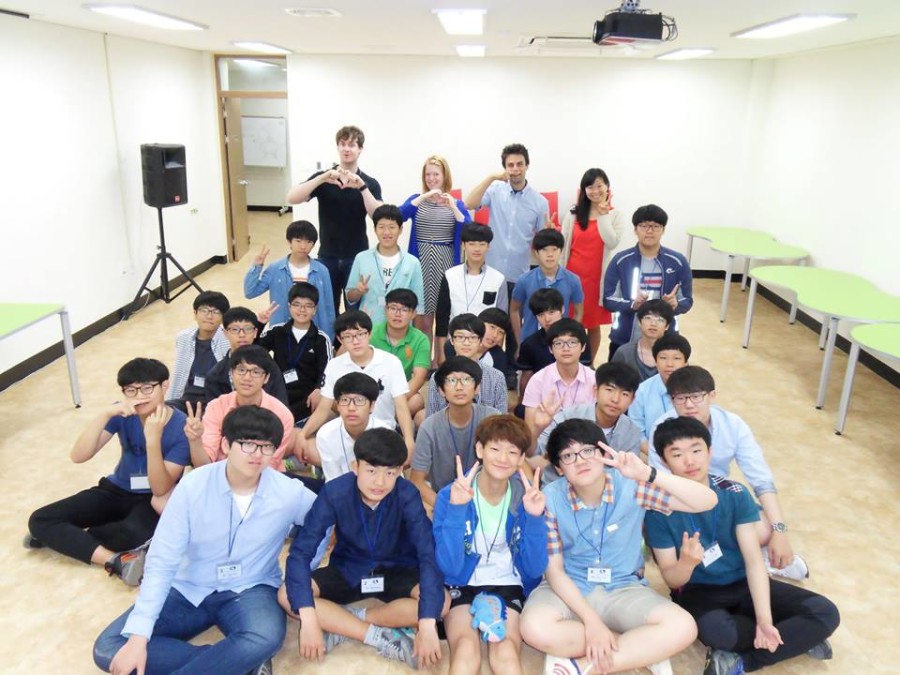
In which settings do native English teachers work?
There is a huge market for English education in Korea. Most teachers opt to work in either public or private schools.
Public schools: Most public native teachers are hired through the English Program in Korea(EPIK) and are placed in elementary and middle schools throughout the country.
As part of the national curriculum, students begin English education in third grade and continue until high school graduation. There are two to three English classes per week with the native Korean teacher. One of those classes is with both the Korean and native English teacher. There will always be a Korean teacher in the room (for every class) to supervise and help out if necessary.
It is possible for native teachers to be placed in the big city of Seoul or in a rural village. Students’ English levels will vary significantly, even within the same class, because some students attend private academies.
Private academies (Hagwon). Koreans really value education in such a competitive nation. Almost every student gets extra lessons outside of their regular school day such as math, piano, and English. Academies are private businesses, so each one operates differently.
The following summarizes some of the main differences between public and private schools. Each teacher’s situation will be unique, but so this is simply a generalization.
| Public school (EPIK) | Private academy (Hagwon) | |
| Class size | 20-30 | 5-12 |
| Working Hours | 8:30am-4:30pm | Varies (Kindergarten teachers are usually finished by 6pm, but most hagwon teachers work from around 1pm-9pm) |
| Classes per week | max 22 (paid overtime if more) | 25-30 |
| Work with Korean Co-teacher | Yes | No |
| Choose location | No | Yes |
| Salary | 1.9-2.7 million KRW | 1.8-2.7 million KRW |
| Housing provided | Yes | Usually yes |
| Flight reimbursement | Yes | Usually yes |
| Vacation days per year* | 18 (plus bonus 7 for renewing contract) | 10 |
| Start date | February or August | Anytime |
*Vacation days for public school teachers are limited to winter (10 days) and summer (8 days) vacations. Hagwon teachers
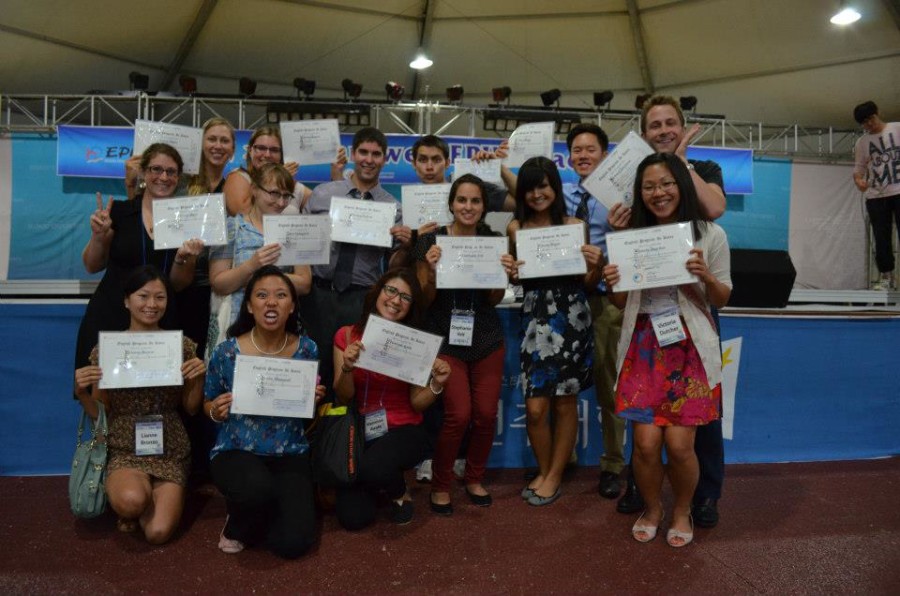
Extra perks with EPIK: Teachers attend a 9-day orientation packed with lessons in teaching methods, Korean language & culture, and social outings. Orientation is a great way to meet fellow teachers who are placed in your city; you will likely make some lifelong friends! Additionally, EPIK teachers get renewal bonuses, severance, pension, national health insurance, and continuing education workshops.
A word of warning: Some private academies are notorious for poor working conditions and not paying teachers on time (or at all). Of course, there are some reputable academies that offer pleasant working conditions, so do your research.
What if I don’t want to work in a public school or private academy?
Less common options are private schools (regular school, not an after-school academy), private immersion schools (like Seventh Day Adventist), and private tutoring. If you are a licensed teacher, you can work at an international school teaching regular subjects in English. Additionally, experienced teachers with a Master’s degree can look into teaching at a university.
Who can apply to teach in South Korea?
Native English speakers from the United States, Canada, United Kingdom, South Africa, Australia, or New Zealand. Private schools can hire anyone from around the world, but if they are not from one of those native speaking countries, their visa cannot be sponsored.
Those who hold at least a Bachelor’s degree. If you have a degree in an unrelated field, such as engineering, it is a good idea to get a TESOL/TEFL/CELTA certificate. EPIK has become more strict in that you must have a 100-hour certificate (with a 20 hours being in-class).
A clean background check. You must submit an FBI criminal background check with an apostille attached. If your paperwork comes out anything other than clear, then you will not likely be hired.
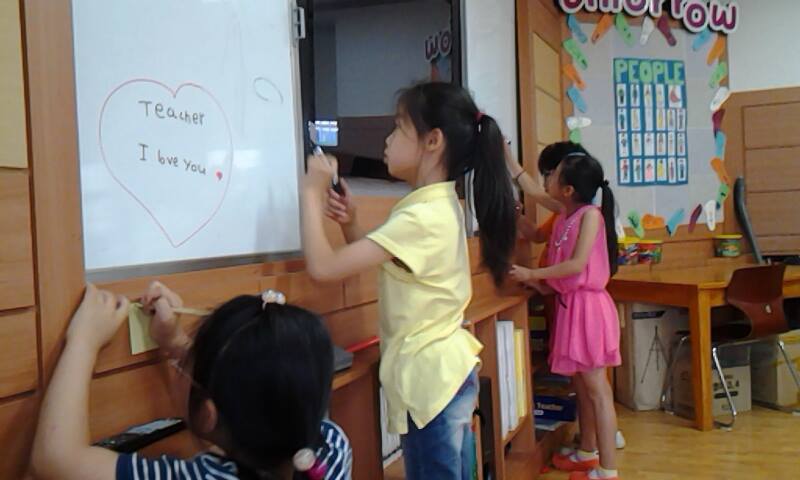
Is Teaching English in Korea for Me?
Well, depends on you!
I met English teachers of all ages, racial backgrounds, and personalities. Even introverts can be effective teachers. What’s great about teaching is that you have a degree of flexibility in your lessons to suit both your teaching style and personality to best meet the needs of the students. What works for one teacher can be a disaster for another.
Believe it or not, you do not have to be a grammar guru to be a good English teacher. Koreans focus heavily on grammar and writing in their English education, so it is possible that they know more grammar rules than native speakers. The native teacher is there to help students with listening and speaking skills, boost confidence, make English fun, and familiarize students with foreign cultures.
If you are patient, flexible, feel energized by being around young people, and thrive off of being in a new culture, then chances are you will love it. If you do not like children, please do yourself and the students a favor and don’t bother. Sure, teachers benefit by getting paid to travel and live abroad, but don’t forget the main reason you are there is to be a good teacher.
What advice would you give to new teachers in Korea?
Learn Korean. Knowing a bit of the language will make a world of a difference in your day-to-day life and the relationship with students and coworkers. Fortunately, one can learn how to read Hangeul (the Korean alphabet) in less than a day.
Be flexible. Things work differently in Korea than in the west. You might be the last to hear about a teacher dinner that evening, classes might be canceled/added unexpectedly, your classroom computer might not work during some lessons, or your coteachers might continually comment on your eating habits. Try to find a happy balance between respecting both their culture and yours. While the situation cannot always change, attitudes can. Saving face is of utmost importance, so losing your temper and being publicly outraged is a no-no.
Get involved in the community. Being so far away from the familiar can be downright difficult. Fortunately, there are plenty of ways to get involved in your community, especially if you live in a bigger city. Join some Facebook groups for expats, volunteer regularly at a local orphanage, take up taekwondo, sign up for a running race, or find a language partner. There are endless opportunities to stay active outside of work.
Work on a passion project. Let’s say you want to join a chess club, but cannot find one in your area. Take initiative and start one! Your ventures will likely be supported by both expats and locals.
Travel domestically. Korea is a beautiful country, so take advantage of the weekends and experience it! The mountains, islands, beaches, festivals, temples, foliage, cherry blossoms… there is something to suit everyone.
Teaching English in Korea Resources
English Program in Korea (EPIK): You can choose to apply directly to EPIK or work with a recruiter. I went through Korvia Consulting and highly recommend them.
Dave’s ESL Cafe: The one stop shop of TEFL.
Waygook: Meaning “foreigner” in Korean, Waygook is the ultimate resources for all things TEFL in Korea. It is especially useful for public school teachers sharing lesson plans for the national textbooks.
Eat Your Kimchi & Evan and Rachel: Entertaining, informative, and well-made vlogs on all things Korea.
Talk To Me in Korean: Excellent Korean language and culture lessons. The inspiring omniglot, Hyunwoo Sun, and his team are just wonderful.
Budget Travel Tips for South Korea: The author’s Korea travel advice
✈️ Protect your Korea trip with Travel Insurance – We’ve started using Nomad Insurance by Safety Wing for affordable evacuation, international medical, and trip coverage.
About the Author:
Lianne is a Korean-American adoptee who taught elementary school in Korea for three years. She traveled to nearly every Asian country with her boyfriend on a budget of $15 per day. She is passionate about finding ways to make travel meaningful on a budget such as CouchSurfing and volunteering. In May 2016, Lianne will start teaching English in Japan. Read more about her teaching experiences, travel tips, and adoption story at LianneBronzo.com.
In June 2020, this article was updated with the help of Marie Boes.
Like this post? Pin it for later or share with friends!

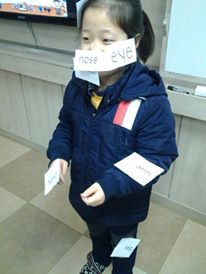

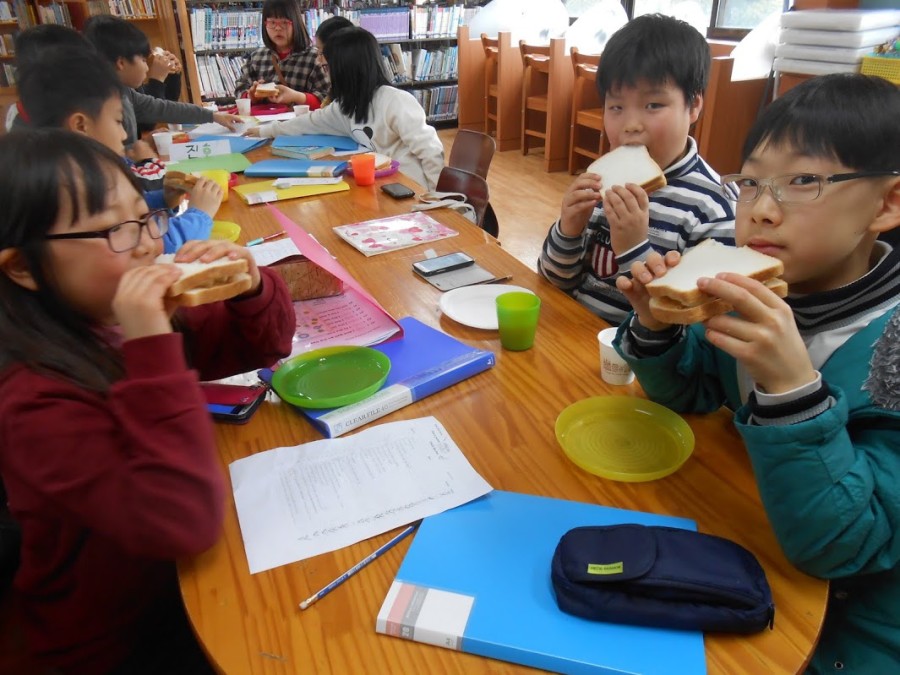





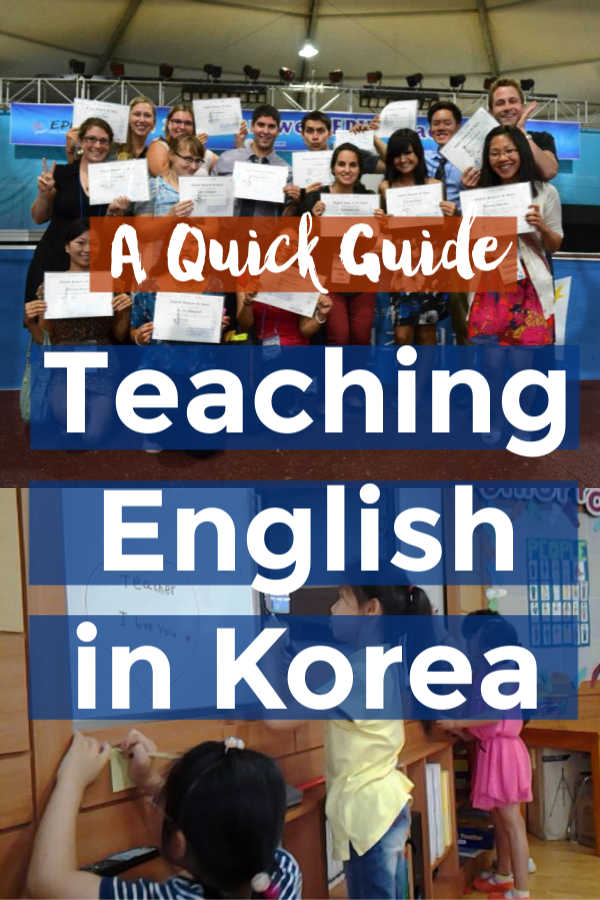





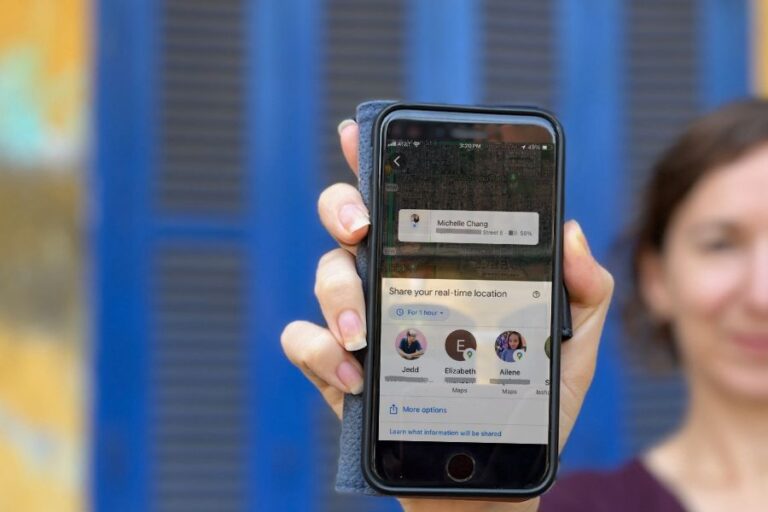
Copying in a comment from Reddit with some more specifics and alternative perspectives:
“Nice guide. A few amendments you might want to consider making, and don’t take this the wrong way as it was well written:
– I would say Hagwons vary in size up to 15 kids. They can also be as small as 1. I think 1-15 is a more accurate range, but you could say “usually 5-12″
– Hagwons these days can go up to 35 teaching hours (unfortunately)
– You can make more than 2.7 in a hagwon, although admittedly rare.
– Plenty of hagwons, including everywhere I’ve worked, has a Korean co-teacher. How much they actually co-teach varies depending on the hagwon. My first one, it was 50-50
– IIRC, Epik pays Round Trip Flights, but hagwons these days lean towards one-way
– Vacation – This is a sticky point to me. The longer you are in a hagwon and the more valuable you are, the ’10 days’ are flexible. I personally get 5 weeks right now (3 paid, 2 unpaid) because I negotiated this. It is uncommon, but not THAT rare.
Start time – While yes, you can start anytime in a hagwon, it should be noted that the better ones prefer to start the same as epik, to ensure that the hagwon schedule and teacher matches a school year or semester at the very least.
– It should be noted that with more teachers knowing their rights and about the labor board’s protections, not getting paid can be fought and won.
– Extra perks with EPIK – While it is true you meet people, I feel like this misleads the reader into thinking that you get to network with more foreigners than in a hagwon. You don’t and for the most part you might be the only foreign teacher in your assigned school. In a hagwon however, there are often other foreign teachers. In addition severance, pension, and national health insurance are all provided by law and it misleads the reader into thinking a hagwon does not provide these. In addition, I’ve never heard of a hagwon NOT offering a renewal bonus equal to 100k or more a month, which is on par or more than what epik offers. I do like the education workshops, but some hagwons provide these too.
– I think you missed Ireland as one of the countries that can teach in Korea.”